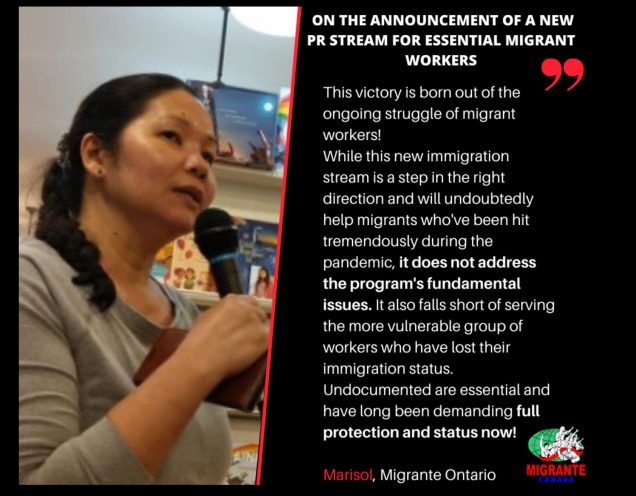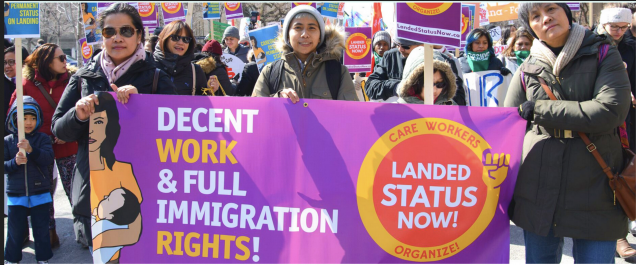For migrant workers: New pathways to permanent residency welcome but exclude many
For migrant workers: New pathways to permanent residency welcome but exclude many
 April 19, 2021
April 19, 2021
By Veronica Silva Cusi
The Philippine Reporter
The federal government on April 14 announced new pathways that will allow essential workers and recent international graduates already in Canada to seek permanent residency. The programs, though, are temporary and capped.
Nevertheless, migrants rights advocates who have been advocating for PR for thousands of temporary workers and international students claim victory in their campaign. But with thousands more left out, including essential but undocumented workers, they said they will continue to advocate for status.
The new pathways are open from May 5, 2021 to November 5, 2021 and capped at 90,000 PR applications as follows:
• 20,000 for temporary workers in health care
• 30,000 for temporary workers in other selected essential occupations
• 40,000 for international students who graduated from a Canadian institution
The new pathways are for those already in Canada and have at least one year of work experience in specified National Occupational Classification (NOC), such as registered nurses, specialty physicians and home support workers.
Immigration Minister Marco Mendicino, in a video press announcement, said the new policy is a “broad, fast and innovative path to permanent residency … that will support workers from more than 100 essential occupations that are vital to our economy.”

MARCO LUCIANO
These include 40 healthcare occupations and 95 other essential jobs in diverse areas – from caregiving to food production and distribution.
He added: “We are creating pathways for newcomers to strengthen their job security, expand their career horizons and encourage them to put down deeper roots in our communities where they are giving back.”
For international graduates from Canadian institutions, they have to be graduates “no earlier than January 2017.” They must also have completed a program that is at least eight months long or leading to specified groups of essential work and trades.
In a press statement reacting to the announcement, Migrant Rights Network (MRN) is claiming “win” on this announcement that has a “short-term window for thousands of migrants who are able to meet restrictive criteria.”
“Ten months ago today we began our campaign for full and permanent immigration status for all. Today, migrants won a major victory,” the MRN campaign media release said on April 14.

Ethel Tungohan
However, the announcement “doesn’t fundamentally alter the structure of the immigration system but instead opens up a very brief window that will open up and excludes most,” said Syed Hussan, in a virtual conference on the same day.
According to MRN estimates, “over 650,000 temporary work and study permits were issued in 2020, and there are over 1.6 million migrant and undocumented people in Canada.” Many of them are also in the same essential work industries that are included in the new pathways.
“This policy shows that the Canadian government is taking into account the added labour and health-care pressures wrought by COVID-19,” said Ethel Tungohan, York University professor and research chair in Canadian Migration Policy, Impacts and Activism in an email response to The Philippine Reporter.
“As with previous measures, however, the new policy changes are only ‘temporary.’ Thus, what this shows is that the Liberal Government is reluctant to pass permanent measures, choosing instead to put quick and temporary fixes to existing and long-term problems,” she added.
Undocumented workers
Marisol Bobadilla, an undocumented worker from the Philippines, has become one of the faces and voices of MRN’s campaign.
She told The Philippine Reporter that upon hearing the new policies, she had mixed emotions. She is happy that the government has heeded their campaign for protection for migrant workers. At the same time, she felt sad because only a small percentage of migrant and undocumented workers will be given the opportunity to apply for PR.
“Bukod sa maliit na porsyento, kailangan pa nila dumaan sa English test (Aside from the small percentage, migrant workers still have to undergo the language proficiency test),” she added.
 To be granted PR status, applicants are required to have a language proficiency levels 4 or 5 for each of the four language skills in either of Canada’s official languages.
To be granted PR status, applicants are required to have a language proficiency levels 4 or 5 for each of the four language skills in either of Canada’s official languages.
In the same video news conference organized by the MRN, Bobadilla said: “When we are organized and have unity [among] the different sectors in the working class, government has no other option but to listen to our demands. However, she added that the new policy does not address the fundamental issue – the temporariness of workers.
In the interview, Bobadilla noted that in the announcement, the Canadian government has recognized the contribution of temporary workers in essential sectors and international graduates to boost Canada’s economy.
The IRCC statement reads: “These special public policies will grant permanent status to temporary workers and international graduates who are already in Canada and who possess the skills and experience we need to fight the pandemic and accelerate our economic recovery.”
If the government’s intention is to give PR status to those who have contributed to Canada, no one should be excluded, Bobadilla added in Tagalog.
She said she continues to do essential work even during the pandemic, even though it is risky as she doesn’t have health benefits and is not entitled to COVID-19 economic relief. And by continuing to work, she said she continues to contribute to Canada’s economy.
She added that undocumented workers do not intentionally want to be out of status and put their lives at risk. She herself arrived in Canada legally as a temporary worker in Prince Edward Island. However, some of TFWs have unfortunately fallen victims to illegal recruiters in their quest for permanent status.
In Alberta alone, Marco Luciano of Migrante Alberta estimates that there are from 25,000 to 50,000 undocumented migrant workers who were formerly temporary foreign workers. In central and southern Alberta, Luciano said there are thousands of farm workers who contribute to Canada’s food security, yet they are left out due to the language requirement.
“Farm workers and undocumented migrants are essential workers, and they must be part of government’s priorities in creating these policies,” he added.
Migrant groups said they will continue with their campaign for “status for all.”
“We will not stop until every migrant and undocumented worker in the country achieves full and permanent immigration status and working class immigrants arrive in the future with permanent residence status,” said Hussan.
“These new policies show that the government there’s nothing impossible to the government. They can change the immigration system and give PR status. Why are they limiting who are going to benefit from their programs?” said Bobadilla in Pilipino.
Added Tungohan: “This shows that the federal government can no longer avoid recognizing pressing healthcare needs in Canada. This also shows how much the activism of individual community advocates and networks such as the Migrant Rights Network are so important in helping shift policies.”
In focusing on temporary workers and international graduates already in Canada, the federal government noted that the closed borders due to the pandemic have posed challenges to its immigration plan to admit 401,000 new PRs in 2021.
——————————-
 Veronica Silva Cusi is a multimedia journalist and researcher with more than two decades of experience. She was a business journalist for 12 years with Business World in the Philippines and a journalism lecturer for 14 years at University of the Philippines. She’s been covering ethnic media in the GTA for more than a decade and also worked as editor and reporter in Singapore. She holds two master’s degrees — Communication Research and Journalism. You can follow her on Twitter @VSilvaCusi.
Veronica Silva Cusi is a multimedia journalist and researcher with more than two decades of experience. She was a business journalist for 12 years with Business World in the Philippines and a journalism lecturer for 14 years at University of the Philippines. She’s been covering ethnic media in the GTA for more than a decade and also worked as editor and reporter in Singapore. She holds two master’s degrees — Communication Research and Journalism. You can follow her on Twitter @VSilvaCusi.
Comments (0)